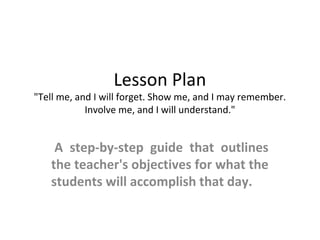
Lesson planpresentation
- 1. Lesson Plan "Tell me, and I will forget. Show me, and I may remember. Involve me, and I will understand." A step-by-step guide that outlines the teacher's objectives for what the students will accomplish that day.
- 2. Educational Theories • Maslow’s hierarchy of learning needs. • Constructivism and socio-constructivism • Lave and Wenger’s communities of practice • Spaced repetition • Miller’s assessment pyramid • Bloom’s taxonomy • Mastery, improvement and deliberate practice • Kolb’s learning cycle • Lewis change model
- 3. Kolb's experiential learning style • Everyone learns differently. Some people learn through observation; others learn through doing. To support the many different styles of learning, education theorists and philosophers have developed the experiential- learning cycle.
- 4. experiential-learning cycle • As the name suggests, experiential learning helps students learn through an experience that involves a direct encounter with the phenomena being studied, rather than just thinking about the encounter. The learning cycle drives home a lesson by having students do an act repeatedly, which helps turn concepts into skills and memory.
- 5. experiential-learning cycle. • The learning cycle is composed of four stages: experience, process, generalize, and apply. Each stage drives the next in a continuous loop. • First, students experience what they are going to learn about through a concrete activity. • Then they process the experience by looking back and evaluating it through reflections and observations. • Next, they generalize what was important about the project by developing theories and concepts. • Finally, they apply the information they've learned by testing it in another activity.
- 6. Theory is typically represented by a four stage learning cycle in which the learner 'touches all the bases':
- 7. Learning Cycle in Your Lessons How can you integrate the learning cycle into your lesson plans? Here are some basic guidelines. • Expose your students to the skills and concepts they're learning through examples and activities. • Help students master the subject matter by moving through this cycle a number of times using different stimuli. • Build time into each lesson for students to process (by asking questions and doing structured practice) and generalize (by learning about more abstract theories related to the skill or seeing its use outside of the classroom). • Allow adequate time for sharing ideas and questions. • Use open-ended questions to stimulate thinking. • Use outside examples to tie in concepts for each activity. • Use positive feedback to give students feeling of mastery at each stage of the cycle.
- 8. Socratic Questioning and Critical thinking • Getting students to clarify their thinking/ Explore the origin of their thinking e.g., ‘Why do you say that?’, ‘Could you explain further?’ • Challenging students about assumptions e.g., ‘Is this always the case?’, ‘Why do you think that this assumption holds here?’ • Evidence as a basis for argument e.g., ‘Why do you say that?’, ‘Is there reason to doubt this evidence?’ • Alternative viewpoints and perspectives/ conflict with other thoughts e.g., ‘What is the counter-argument?’, ‘Can/did anyone see this another way?’ • Implications and consequences e.g., ‘But if...happened, what else would result?’, ‘How does...affect...?’ • Question the question e.g., ‘Why do you think that I asked that question?’, ‘Why was that question important?’, ‘Which of your questions turned out to be the most useful?’
- 9. COMPONENTS OF OUR LESSON PLAN • Objectives and goals • Content and teacher activity (Warm up/Instructions given by the teacher) • Independent/Differentiated Activities for Learners (Emergent, Capable & Proficient) ( Plan you activities according to the gradient tasks). • Learning Checks (Questions for AfL/Plenary) Closure: Summarize/presentation/solve questions from the text, etc. The closure can preview what the students will learn in the next lesson and provide a smooth transition to the next lesson. • Lesson Outcome (How do you know that the lesson objective is achieved?) • Resources
- 10. Additional components • Opportunities for learning to be differentiated • Kinesthetic: Yes • Visual: Yes • Audio: • Home Assignment / Reinforcement Assignment • Follow Up Things, you felt ,need more attention/something you missed out due to disruptive behaviour /long topic.
- 11. Question &answer session Dear teachers, don’t feel stumped. When circumstances warrant it, it is perfectly fine to change or deviate from your plan. But remember a well scripted lesson plan mirrors your class.
- 12. Lesson Plan